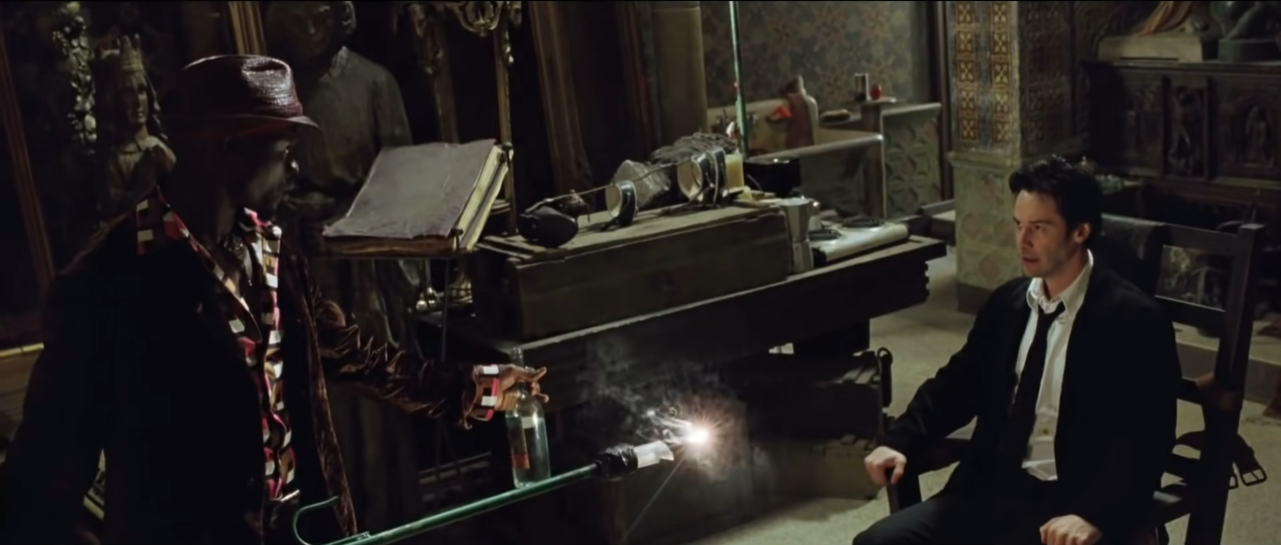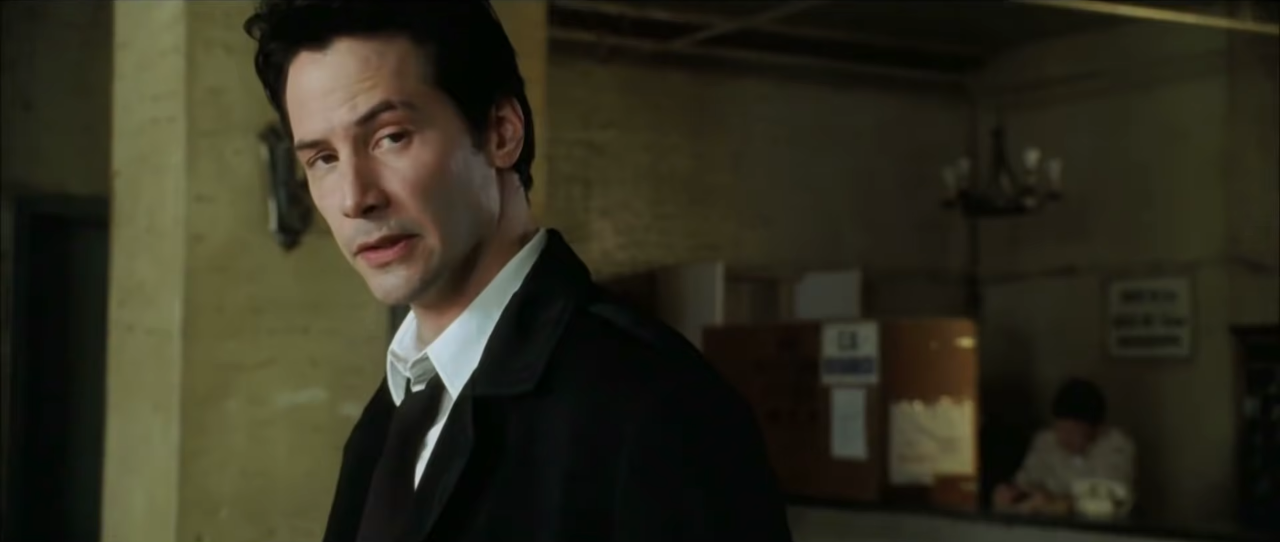Constantine (2005) | Fair or Foul
It was announced not too long ago that Keanu Reeves would soon reprise his role as the demon-fighting anti-hero, John Constantine. While I’m happy for Reeves getting opportunities, as he’s one of the few actors who doesn’t appear to be an obnoxious narcissist, my enthusiasm for the announcement is tepid at best. I wouldn’t call myself a Constantine fan (or Hellblazer fan, as that’s the name of the comic series he’s in), but I also know enough to say that Reeves was never the right choice for the role. His reprisal is mostly just the same reason he was chosen in the first place: name recognition.
All that being said, what about the film that already exists? I saw it in theaters back in 2005, and I’ve watched it multiple times since then. It’s something of a guilty treat of mine, similar to Deep Blue Sea. So I could have added it to a different review category on this site. However, I feel that this movie fits well into the Fair/Foul category because of how its pros and cons balance this movie out in a lot of ways. Let’s get started!
Image: Warner Bros.
What is it?
John Constantine (Keanu Reeves) is a miserable loner with a smoking addiction who helps out on odd jobs around the city of Los Angeles. These odd jobs are not your typical repairman or plumber tasks. They involve exercising demons from young women or investigating mysteries of the occult. One day, he encounters a young police detective named Angela Dodson (Rachel Weisz) who is investigating her twin sister’s death. She refuses to believe it was a simple suicide and soon learns that Constantine can help her find out more details as weird things start happening around her. Before you know it, demons start attacking, the world is in peril, and Lucifer himself shows up as the two of them uncover a plot to destroy the world.
Fair: The “Villains”
Constantine is a movie with some memorable characters and great performances. I put quotations around “villains” because while they are antagonistic toward Constantine, they’re not all working together to the same ends. Tilda Swinton is always good, even in bad movies like Snowpiercer, and especially in good movies like Michael Clayton. Her casting as Gabriel was a great choice because of the inherent androgyny of angels and her unique physical appearance. It’s also because she’s able to come across as wise and generous, as well as malevolent. Gavin Rossdale, likewise, is very good as the demonic counterpart, Balthazar. He only appears in a few scenes, but he chews up every one of them. He’s got a lot of handsome charisma and channels the demonic, greedy Wall Street broker he’s playing.
Image: Warner Bros.
The major standout that everyone remembers, however, is the man who has appeared on countless top-10 lists of great moments and characters. Lucifer himself, played by Peter Stormare. I remember after I saw the film in theaters and talking about it to friends, his brief appearance was always in the conversation. He’s in the movie for less than 10 minutes, but Stormare’s playful portrayal is so perfect that he just grabs your attention and holds it. It’s a performance that’s on par with Heath Ledger’s Joker in terms of both menacing playfulness and talent. It’s just a shame that we see so little of it. Or maybe it’s better that he is there only for a moment and it leaves us wanting more.
Foul: Keanu & Shia
On the other side of the spectrum are the heroes. Rachel Weisz is perfectly fine as she most often is, so she’s able to do the heavy lifting of moving the plot forward with some emotion. It’s the two male leads that are the problem. I’m a fan of Keanu Reeves, but I also know where his acting capabilities have their limitations. There could have been far worse picks for the role of John Constantine, but he’s also a character with a lot of depth and inner conflict that exists outside of Reeves’ skillset, in my opinion.
Constantine is a man who talks in a monotone about a lot of things, but he’s also supposed to be somewhat unlikable because of how indifferent and pessimistic he is. With all due respect to Reeves, I don’t think he’s really able to pull off that complexity, despite his monotone delivery. I also think he’s just a little too likable for the character in some ways. When he says mean or apathetic lines that are meant to piss off other characters, you never really get the sense he means it or that he isn’t going to help in some way. He was riding high off the Matrix trilogy at the time, so he was getting a lot of roles from name recognition, but I would say his performance here lends very little to the film. Thus, I’m not entirely excited about his return to the franchise decades later, despite his return to prominence.
Image: Warner Bros.
And then there’s Shia LaBeouf. Everyone knows his reputation for either being a bad actor or an eccentric individual who went through a few low points in his career due to mental health issues. I feel there’s no real need to belabor the point, and perhaps he’s gotten better since then. You should just know that his cliché character of Chaz Kramer adds no humor or interest like the filmmakers hoped it would. He’s just the annoying kid character who wants the reluctant Constantine to be his mentor, and LaBeouf is unable to make him interesting or unique.
Fair: Art Design
The depiction of Hell and its inhabitants in any movie is always memorable, and it’s no different in Constantine. While the CGI does not look great today, the design of Hell and the demons in it are still striking images. Likewise, the supernatural creatures that have escaped Hell also leave a bit of an impression. From demons made out of insects attacking Constantine in the street to the villains strutting their stuff in costume and makeup. The makeup on Balthazar, the wings on Gabriel, and the white suit on Lucifer are all striking and leave an impression. The fact that all these characters look cool adds to the performances of the actors and the impact of their actions. When Constantine briefly goes to Hell and has to make a daring leap to escape the horde of demons chasing him, it's an image that was clearly drawn out beforehand and captured on screen with the intent to make you remember it. It worked.
Foul: Big Story, Small Constantine
I will not assume to be a Hellblazer fan who knows everything about the comics, so I don’t know if this movie’s plot already existed in comics beforehand. However, I have read a few stories that had much smaller stakes than the end of the world. In those stories, short as they were, Constantine was more fleshed out and allowed to star in the stories even though the main conflicts were surrounding other characters. Since this was the first attempt at a Constantine film, I’m sure they wanted to make a big impression with a big story about the end of the world. However, I think it runs into the same issues as the Judge Dredd film from the 1990s versus its spiritual successor Dredd.
Image: Warner Bros.
If you look at the first Judge Dredd movie, it’s big and bombastic, and Sylvester Stallone is the law. However, it also establishes the world of Judge Dredd only to have a plot that practically dismantles everything in it. If you want people to become interested in your futuristic world to the point that you would want them to become new fans who would come back for more movies, why would you immediately destroy it? Or why would you go immediately to an endgame scenario instead of letting the world build more and more over the course of other films? If we compare Judge Dredd (1995) to Dredd (2012), we have a much simpler movie with a straightforward plot that feels tighter, more grounded, and more thought-out. It just allowed the character to handle a situation within this world with his set of skills without getting too big for his britches. While I enjoy the Stallone movie for different reasons, Dredd is one of the best examples of a comic-book character in a big universe done right, without having to resort to epically big plots. Constantine doesn’t destroy its own fictional systems, but it jumps the gun on stakes, as far as I’m concerned. The one thing I’m hopeful for the next Constantine film is that they take a similar approach to Dredd. Hopefully, it will have a smaller story with a bigger focus on the character and won’t raise the stakes too high.
Fair: Lore Building
Constantine and John Wick are similar in another aspect beyond simply having the same movie star: The way in which they build out their fictional universe and the rules that govern it. We get introduced to different concepts, weapons, traditions, etc., and it’s all done rather efficiently in both films. Rachel Weisz’s character is mostly there as the vessel to explain supernatural things to the audience, but there’s a fair amount told through visual storytelling that we can pick up on as well. The key difference between John Wick and Constantine in terms of their lore was that the lore of Constantine already exists in the Hellblazer comics, meaning a lot of material is already thought out and established. John Wick’s universe continues to build out with each movie, which is turning out to be a problem as they continue to raise the stakes because the world gets less interesting the more I learn about it. We’ll see if the next Constantine film can escape that fate.
Verdict: Fair
It should come as no surprise that I think Constantine falls into the Fair category since my biased opinion was established at the top. It’s a very flawed movie that could have been a lot better, but it has a lot of qualities I still appreciate. I do want a sequel to expand the established universe more, but I am also not enthusiastic about it when you consider how bad the writing in movies has gotten over the past few years. Hopefully, the filmmakers can take the lessons of Dredd and deliver something that makes it a franchise worth revisiting.










